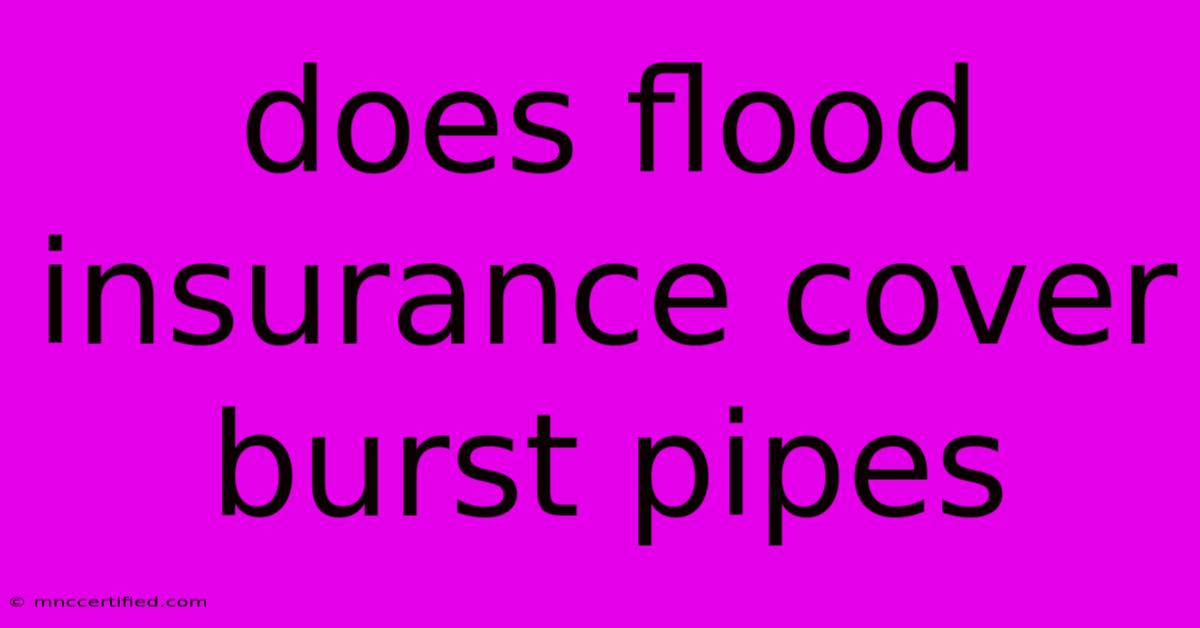Does Flood Insurance Cover Burst Pipes

Table of Contents
Does Flood Insurance Cover Burst Pipes? A Comprehensive Guide
Many homeowners mistakenly assume that flood insurance covers damages caused by burst pipes. However, the reality is more nuanced. While flood insurance plays a crucial role in protecting your home from water damage, its scope is limited, and burst pipes usually fall outside its coverage.
Understanding Flood Insurance Coverage
Flood insurance is a separate policy from standard homeowner's insurance. It protects your home from damage caused by flooding, which is defined as the overflowing or unusual and rapid accumulation of water on normally dry land. This includes events like:
- Heavy rainfall: Excessive precipitation leading to overflowing rivers, lakes, or streams.
- Coastal storms: Hurricanes, tropical storms, and nor'easters causing storm surge.
- Tsunamis: Massive waves triggered by earthquakes or volcanic eruptions.
- Seiche: Water levels fluctuating in lakes or bays due to wind or atmospheric pressure.
Why Burst Pipes Aren't Covered
While water damage is a common concern, flood insurance specifically excludes damages caused by plumbing failures, including burst pipes. This is because the water source for a burst pipe originates from within the home, not from an external source like a flood.
Instead, damages from burst pipes are typically covered under your homeowner's insurance policy. This policy protects against perils like:
- Water damage from plumbing fixtures: Leaking pipes, faulty faucets, or broken appliances.
- Frozen pipes: Damage caused by pipes freezing and bursting due to extreme cold.
- Other perils: Fire, theft, vandalism, and more.
What to Do in Case of a Burst Pipe
If you experience a burst pipe, here's what to do:
- Shut off the water supply: Locate the main water valve and shut off the water immediately.
- Contact a plumber: Call a licensed plumber to assess the damage and begin repairs.
- Document the damage: Take photos and videos of the affected areas for insurance purposes.
- File a claim with your homeowner's insurance: Inform your insurance company about the incident and provide all necessary documentation.
- Protect your property: Take steps to prevent further damage, such as drying out wet areas and removing damaged belongings.
Prevention is Key
To minimize the risk of a burst pipe, consider these preventive measures:
- Regular inspections: Have a professional plumber inspect your plumbing system annually for leaks and potential problems.
- Insulate pipes: Insulate pipes in unheated areas of your home, especially in colder climates, to prevent them from freezing and bursting.
- Maintain your plumbing: Repair leaky faucets, pipes, and appliances promptly to avoid further damage.
- Install a water leak detection system: These systems alert you to leaks before they cause significant damage.
Conclusion
Remember, flood insurance is crucial for protecting your home against external flood events, but it doesn't cover damages caused by internal plumbing failures like burst pipes. Understanding your insurance coverage and implementing preventative measures can help safeguard your home and your finances from unexpected water damage.

Thank you for visiting our website wich cover about Does Flood Insurance Cover Burst Pipes. We hope the information provided has been useful to you. Feel free to contact us if you have any questions or need further assistance. See you next time and dont miss to bookmark.
Featured Posts
-
State Farm Hunting Lease Insurance Cost
Nov 09, 2024
-
Limited Liability Company Invest Group
Nov 09, 2024
-
Marseille Players Raise Funds For Spain Flood Victims
Nov 09, 2024
-
Nepal U 19 Womens Team Wins Qualifier Match
Nov 09, 2024
-
Software Developer Liability Insurance
Nov 09, 2024